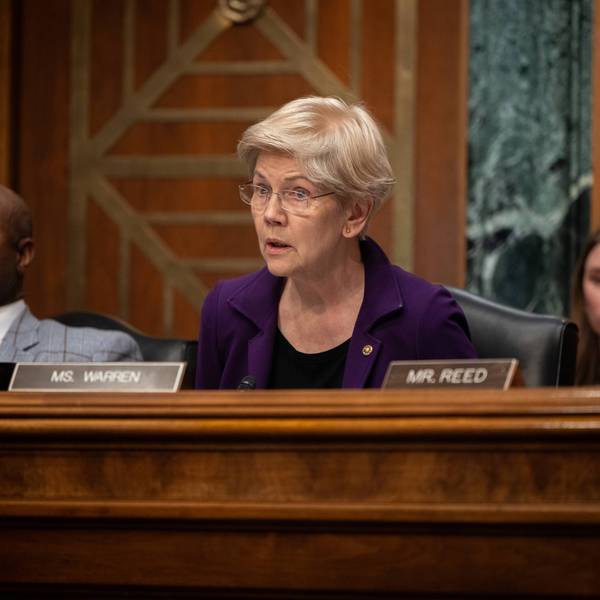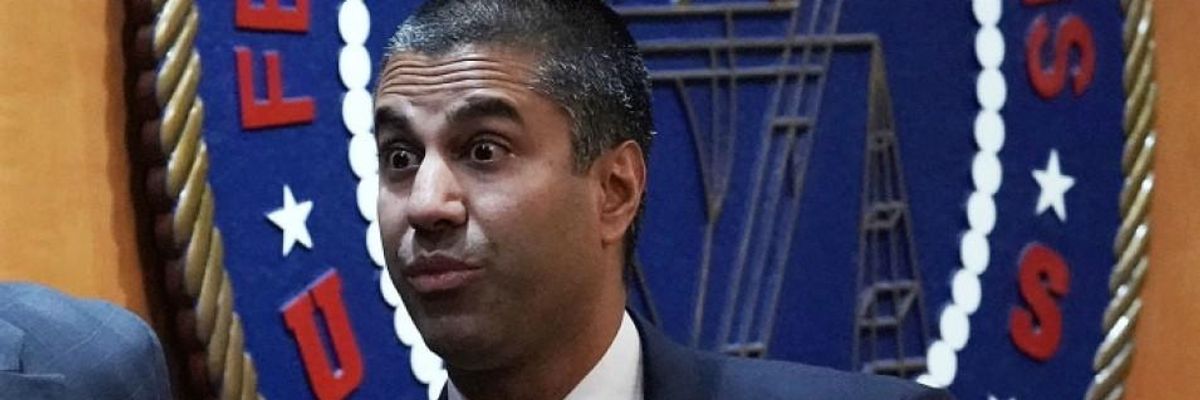After Federal Communications Commission Chairman Ajit Pai formalized his support for the $26.5 billion proposed merger of T-Mobile and Sprint, consumer advocates reiterated warnings Wednesday about the anticipated consequences of allowing the country's third- and fourth-largest wireless carriers to become one company.
"Despite Chairman Pai's bogus claims, nothing about this deal would lower prices for customers or lead to faster 5G deployment."
--S. Derek Turner, Free Press
S. Derek Turner, research director at the national advocacy group Free Press, vowed in a statement this his organizations and other opponents of the merger remain dedicated to fighting against "the FCC's ham-fisted effort to ram through this toxic deal."
Turner's promise came in after Pai shared with his fellow FCC commissioners a draft order which would approve the proposed merger and encourage them to support it. Although the draft order is not yet public, the chairman released a statement touting the supposed benefits of the deal, without offering any evidence.
"After one of the most exhaustive merger reviews in commission history, the evidence conclusively demonstrates that this transaction will bring fast 5G wireless service to many more Americans and help close the digital divide in rural areas," Pai said. "Moreover, with the conditions included in this draft order, the merger will promote robust competition in mobile broadband, put critical mid-band spectrum to use, and bring new competition to the fixed broadband market."
Noting that Pai expressed his support for the merger months ago, while commission staffers were still reviewing it, Free Press's Turner said, "We eagerly await the details of this draft order, which will remain outside of public view for some weeks, to see just how the FCC's GOP commissioners justify jettisoning decades of precedent."
Echoing previous warnings about the deal's impact, Turner charged that "despite Chairman Pai's bogus claims, nothing about this deal would lower prices for customers or lead to faster 5G deployment. And the loss of competition would disproportionately harm low-income people and communities of color."
Matthew Buck, a researcher and reporter at Open Markets Institute, said in a statement Wednesday that "should it proceed, T-Mobile's market power will be immense--controlling roughly 50 percent of the pre-paid market. Furthermore, the deal will result in higher prices for all consumers, and worse phone service--especially for rural Americans."
Democratic FCC Commissioner Jessica Rosenworcel took to Twitter Wednesday to speak out against the merger and her concerns with Pai's draft order.
"I believe we need more competition, not less. I am not convinced that removing a competitor will lead to better outcomes for consumers," she wrote. "But what I am convinced of is that before the FCC votes on this new deal negotiated by Washington, the public should have the opportunity to weigh in and comment. Too much here has been done behind closed doors."
Turner concurred that "given the harmful impacts of this merger... the public should have the opportunity to weigh in and comment before the full agency vote is final."
"The good news is that attorneys general from 15 states and the District of Columbia have joined a lawsuit to block the merger," he said. "Free Press looks forward to the state AGs trying their case in front of an impartial court."
New York Attorney General Letitia James, who is leading that legal challenge with California's Xavier Becerra, announced Monday that Oregon had joined the case.
"Oregon's addition to our lawsuit keeps our momentum going, and ensures that there isn't a single region of this country that doesn't oppose this anti-competitive megamerger," said James, noting that the coalition that now represents almost half of the U.S. population. "We remain committed to blocking the merger of T-Mobile and Sprint because it would bad for consumers, bad for workers, and bad for innovation."




